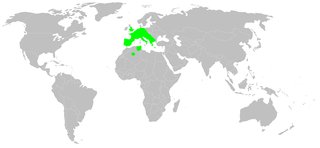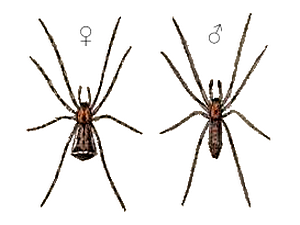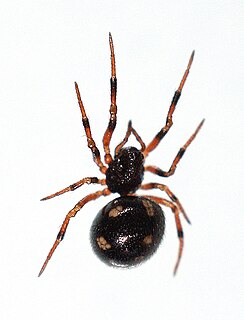
Episinus maculipes is a rare European spider of the family Theridiidae. The known distribution is "England to Algeria, Ukraine, Russia".

Episinus is a genus of comb-footed spiders that was first described by Pierre André Latreille in 1809.

Episinus truncatus is a small dark tangle-web spider, with a palearctic distribution.

Segestria senoculata, sometimes known as the snake-back spider, is a species of spider belonging to the family Segestriidae. It has a Palearctic distribution.

Enoplognatha ovata is a species of spiders belonging to the family Theridiidae.

A spider web, spiderweb, spider's web, or cobweb is a structure created by a spider out of proteinaceous spider silk extruded from its spinnerets, generally meant to catch its prey.

Araneus angulatus is a species of orb-weaving spiders found in the Palearctic realm. It resembles the European garden spider, Araneus diadematus, but has distinctive tubercles on its abdomen. The species was first described in Aranei Svecici in 1757, where it was the first species described, making Araneus angulatus the first scientific name of an animal that is still in use.

Harpactea rubicunda is a spider species found in Georgia. It is also found in Lithuania.

Ero cambridgei is a pirate spider species with Palearctic distribution. It is notably found in Lithuania.

Ero furcata is a pirate spider species with Palearctic distribution. It is notably found in Lithuania and the Czech Republic.

Hyptiotes paradoxus is a spider species with Palearctic distribution. It is notably found in Lithuania and Latvia. It is also found in Estonia and Finland.

Crustulina guttata is a spider species with Palearctic distribution. It is notably found in Lithuania.
Cryptachaea riparia is a spider species with Palearctic distribution. It is notably found in Lithuania.

Enoplognatha thoracica is a spider species with Holarctic distribution. It is notably found in Lithuania.

Euryopis flavomaculata is a tangle-web spider species with Palearctic distribution. It is notably found in Lithuania.

Platnickina tincta is a tangle web spider species with Holarctic distribution. It is notably found in Lithuania.

Lasaeola prona is a tangle web spider species with Holarctic distribution. It is notably found in Lithuania.
Lasaeola tristis is a tangle web spider species found from Europe to Central Asia. It is notably found in Lithuania.
Lessertia dentichelis is a spider species found in Europe, Canary Islands, Madeira, Canada and New Zealand. It is notably found in Lithuania. There is also a notable population in Kungsträdgården metro station, in Stockholm; this is the only place in Northern Europe where the species can be found. Presumably the spider traveled to Sweden on machines and equipment from Southern Europe when the station was being constructed in the early 1970s.
















